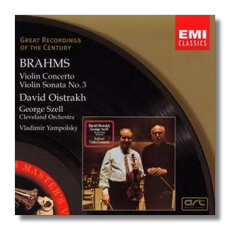
The Internet's Premier Classical Music Source
Related Links
- Brahms Reviews
- Latest Reviews
- More Reviews
-
By Composer
-
Collections
DVD & Blu-ray
Books
Concert Reviews
Articles/Interviews
Software
Audio
Search Amazon
Recommended Links
Site News
 CD Review
CD Review
Johannes Brahms

- Violin Concerto
- Violin Sonata #3 *
David Oistrakh, violin
* Vladimir Yampolsky, piano
Cleveland Orchestra/George Szell
EMI 67973
I started collecting recordings of classical music in 1976. At the end of one year I decided to count and see how many I had purchased. This was easy since I started with none. I had bought exactly 365 LPs. One of them was this particular record of the Brahms concerto, my first and only copy at that time. I was a tyro at the game and didn't appreciate the music so I later gave the disc to the local PBS station. I was young and stupid. Now I am older and stupider.
Since that time I have rued the day I parted with that disc. It was mentioned on several occasions with the highest praise. I had very vague recollections of listening to it and memories of it being pretty good, even though I didn't appreciate it then. On several occasions I bugged my source at EMI, trying to get it on CD. This is, in fact, its first digital incarnation and my recollections were correct. This is a Great Recordings of the Century release.
In the liner notes the author, Tully Potter, quotes Oistrakh as referring to the "rage" in the first movement. This took me by surprise, perhaps because that would bring to my mind the kind we hear in the opening of the 1st Piano Concerto or Symphony. If there is rage here it is Brahmsian and soon gives way to a tender love song from a mature woman. Oistrakh has a full-bodied voice that engages in a dialogue with the orchestra. Szell is not as driven as he had a tendency to be. Perhaps age instilled in him mellowness. EMI's warmer and richer sound than Columbia's certainly adds to the aural picture. I think that both factors are part of creating an orchestral support matching the tenderness from Oistrakh. In his book The Concerto: A Listener's Guide Michael Steinberg says of the Adagio "What the oboe plays at the beginning of the Adagio is… one of the most beautiful melodies ever to come to Brahms." Listening to this recording you realize what a great orchestra the Cleveland was under Szell. The oboe plays with such a rich sound that at first I thought it was a clarinet. Oistrakh steals in with the same melody. One of the times I was listening to this movement I was taking my daily constitutional. A white butterfly happened to flutter in front of me and I thought that was a perfect way to describe what I was hearing. Oistrakh tears into the Gypsy music at the opening of the final movement. The philosopher David Bohm defines a dialogue as a situation where "the two people are making something in common, i.e., creating something new together."* I can think of no better description of this music making.
The 1978 edition of the Penguin Stereo Record Guide rated this recording second only to a recommendation of Krebbers'. "In reissuing the Oistrakh disc from the two-record set in which it first appeared, HMV have taken the opportunity of improving the sound." It seems odd today that the concerto was originally issued on a two-disc set… on LP. Given the timings they must have placed one movement per side. Now we have the whole thing plus a coupling on one CD.
Then comes that coupling. This was the only recording Oistrakh made of the D minor violin sonata. The violin's more prominent; especially in softer passages but it is a violin sonata. In any dialogue, however, some people will have a stronger voice. The sound here is more distant but clear and is as excellent coupling. I would recommend this, however, for the concerto if it were the only piece on the disc.
There are other Oistrakh recordings of the Brahms. I have not heard the one with Klemperer, but am tempted to check it out. RCA issued a live performance with the Moscow Philharmonic under Kondrashin that suffers from poor sound and a consumptive audience. Avoid it. This issue joins another of my favorites, the very different one from Nathan Milstein (EMI 567021 or the monaural one from the GROC series 567584).
Copyright © 2003, Robert Stumpf II


















